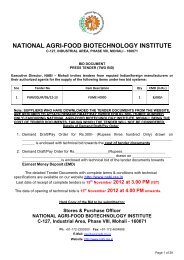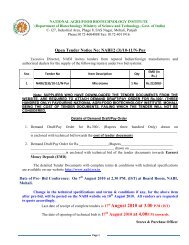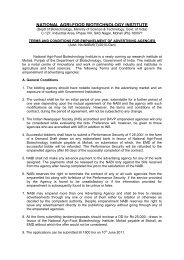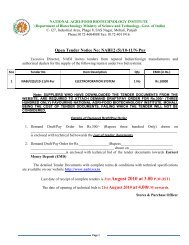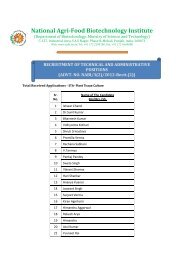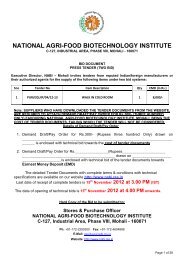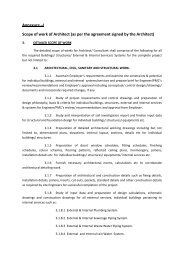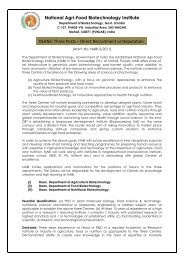Annual Report 2011-2012 - Nabi.res.in
Annual Report 2011-2012 - Nabi.res.in
Annual Report 2011-2012 - Nabi.res.in
- No tags were found...
You also want an ePaper? Increase the reach of your titles
YUMPU automatically turns print PDFs into web optimized ePapers that Google loves.
NATIONAL AGRI-FOOD BIOTECHNOLOGY INSTITUTE4. DIET AND HEALTH4.1Effect of dietary constituents onadipogenesis4.1.1Role of arab<strong>in</strong>oxylans from millets <strong>in</strong>regulat<strong>in</strong>g adipogenesis: A nutrigenomic studyPr<strong>in</strong>cipal Investigator:Kanthi K. KiranCo-Investigator:Mahendra BishnoiIntroduction:Current anti-obesity medications arepharmacological agents which can reduce orcontrol weight. These drugs affect one of thefundamental processes of the weight regulation <strong>in</strong>human body i.e. alter<strong>in</strong>g appetite, metabolism orconsumption of calories. There is only one anti-obesity medication, Orlistat, approved by FDA. Itacts through <strong>in</strong>hibition of pancreatic lipaseenzyme. Rimonabant, act<strong>in</strong>g through blockade ofthe endocannab<strong>in</strong>oid receptor and Sibutram<strong>in</strong>e,a c t i n g t h r o u g h b r a i n b y i n h i b i t i n gneurotransmitter metabolism were previouslyapproved drugs which have been withdrawn fromthe market <strong>in</strong> several countries and regionsObesity is a worldwide epidemic and has asignificant negative impact on health, mortalityand related costs. Diet and genetic factors<strong>in</strong>clud<strong>in</strong>g gene mutations are closely related to thedevelopment of obesity. Untreated, it may lead tochronic diseases, such as diabetes (type II),hypertension, cardiovascular disease and certa<strong>in</strong>type of cancers. P<strong>res</strong>ent anti-obesity medicationsare shown to be associated with side effects uponlong term usage. Phytochemicals such aspolyphenols and non-starch polysaccharides havetremendous health benefits. Arab<strong>in</strong>oxylans (AXs)are non-starch hemicellulosic polysaccharides,major constituents <strong>in</strong> the cell walls of cereals andmillets, are reported to have potential healthbenefits <strong>in</strong> alleviat<strong>in</strong>g disease symptoms such asdiabetes, atherosclerosis and colon cancer. WheatAXs help <strong>in</strong> regulat<strong>in</strong>g the weight ga<strong>in</strong> and obesityby controll<strong>in</strong>g the release of gut hormones likepeptide YY and Glucagon-Like Peptide-1(GLP1). The potential beneficial effects of AXsfrom f<strong>in</strong>ger millet and kodo millet <strong>in</strong> regulat<strong>in</strong>gadipogenesis and their metabolic fate <strong>in</strong> animalmodels will be studied, which is expected toprovide the <strong>in</strong>sight on mechanism of action ofAXs <strong>in</strong> adipogenesis regulation and help <strong>in</strong>design<strong>in</strong>g functional foods with enriched Axs.Research Objectives:llMechanistic studies on the role of AXs onadipogenesis us<strong>in</strong>g mouse 3T3-L1 cell l<strong>in</strong>es<strong>in</strong>-vitro.Modulat<strong>in</strong>g adipogenesis and obesity us<strong>in</strong>gAXs <strong>in</strong> high fat diet <strong>in</strong>duced obese mousemodel through molecular approaches.Long Term Objectives:llTo study the role of high dietary fiberconsumption and the role of gut microbiota <strong>in</strong>alleviat<strong>in</strong>g weight ga<strong>in</strong> and obesity.Design<strong>in</strong>g AXs enriched functional foodmodels that can modulate metabolicdisorders.Research <strong>in</strong> Prog<strong>res</strong>s:Currently, we are standardiz<strong>in</strong>g the cultur<strong>in</strong>g ofpreadipocytes and differentiation <strong>in</strong>to adipocytes.Primers for important transcriptional factors,enzymes <strong>in</strong> the fatty acid pathway and keyadipok<strong>in</strong>es are designed. Chemo-enzymaticextraction of AXs from f<strong>in</strong>ger millet gra<strong>in</strong>s isunder prog<strong>res</strong>s.4.1.2 Transient Receptor Potential (TRP)channel mediated modulation of adipogenesisand obesity by dietary moleculesPr<strong>in</strong>cipal Investigator:Mahendra BishnoiCo-Investigator:Kanthi K. KiranIntroduction:31



